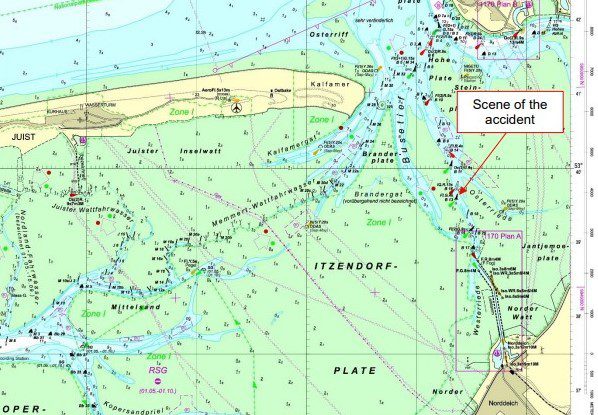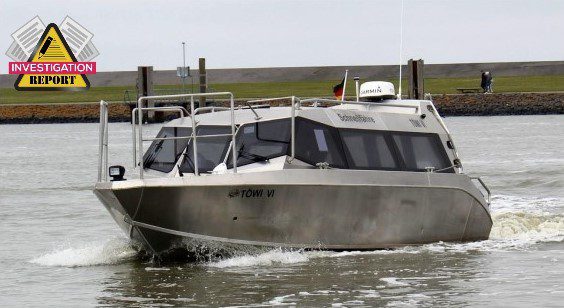The German BSU published its report on the failure of the outboard motor of the small vessel TÖWI VI, on the voyage from Juist to Norddeich on 20 July 2021.
The incident
On 20 July 2021, the small vessel 3 TÖWI VI was en route from Juist to Norddeich in order to transport 7 passengers to the mainland. The weather conditions were good.
According to the information given by the skipper to officers of the Waterways Police station Emden, there was an unexpected failure of the outboard motor used as propulsion at the level of buoy B 13 of the fairway to Norddeich.
Gearbox damage was suspected. Since the outboard motor was the only means of propulsion, the TÖWI VI drifted in the fairway for some time. Later on, the TÖWI VI was towed to the port of Norddeich by another small vessel, where the passengers immediately went their separate ways.
According to the skipper, no person was injured by the incident and no damage was caused to the hull. The passengers could not be questioned by the Waterways Police. The vessel was also no longer available for inspection, as it had already been taken away by land.
Within the connection of the gearbox damage, a small quantity of gearbox oil escaped, whereby a minor water pollution occurred.
The voyage of the TÖWI VI could not be reconstructed due to the non-prescribed and therefore non-existent equipment with a device emitting AIS4 -signals.
Analysis
#1 Safety requirements
By the company Töwerland-Express GmbH, the TÖWI VI was and is used for commercial transport of passengers between the East Frisian Islands and the mainland. The company existing since the year 2019 operates other similar vessels for this purpose. In the process, no more than 12 passengers per trip are transported. Thus, the TÖWI VI is not a passenger vessel within the meaning of the regulations, but a so called small vessel in commercial use.
This is a national category which by definition according to the Ship Safety Ordinance (SchSV) includes cargo ships up to a gross tonnage of 100.
The currently applicable safety requirements of Chapter 3 for small vessel do not apply to small vessels with a ship length of less than 8 m. This means that there are currently no regulations in Germany regarding the construction, equipment (including fire protection and lifesaving appliances) and technical operation of small vessel of this size, as no other technical rules or specifications apply either. Accordingly, no official inspections of these small vessels take place in this regard.
#2 Ship’s manning
In accordance with the Ship Manning Ordinance (SchBesV) in force at the time of the accident, no Safe Manning Certificate was required for the TÖWI VI since her length is less than 8 m. The operator did not voluntarily apply for a certificate.
The vessels operator complied with its obligation in accordance with the Safe Manning Ordinance by manning the TÖWI VI with the holder of a certificate of competency.
In 2019, a German certificate of competence as master BKü (Skipper in coastal fishing) had been issued for the skipper by the Bundesamt für Seeschifffahrt und Hydrographie (Federal Maritime and Hydrographic Agency). This qualifies to navigate fishing vessels with a length of less than 24 m.
In accordance with the Seafarers’ Competency Ordinance (See-BV)11 in force at the time of the accident, all certificates of competency for nautical ship service on fishing vessels included the authority to act as a ship’s master NSF.
However, this certificate of competency was only for navigating certain vessels. Small vessels used for passenger transport, hereafter referred to as “water taxis,” were not included in the final list because this group of vessels did not exist at the time the See-BV was drafted.
Therefore, a certificate of competency NK 500 would be formally required to navigate a water taxi. However, the investigators of the BSU assume that the holders of the certificate of competence BKü are certainly sufficiently competent.
This is true as long as the ship operator acted in accordance with the principle that “persons assigned in the shipping company and on the ship for this purpose are effectively selected, instructed, taught, observed and assisted”.
According to the skipper’s statement to the officers of the Waterways Police, two crewmembers were on board the TÖWI VI at the time of the accident. Since the skipper did not comment on the BSU’s questions, it is unknown what qualifications the second crew member possessed.
 Credit: BSU
Credit: BSU
#3 Operation of water taxis
The small vessels used for the passenger transport < 8 meter, the so called water taxis, became particularly widespread at the North sea coast of Lower Saxony in the last years. They connect the offshore islands with the mainland or with each other.
They operate in relatively sheltered waters. These water taxis compete with the established ferry shipping companies. The user-related advantage of water taxis are the very high speed of the small boats used and the greater independence from tidal water levels.
However, water taxis are also used on the Baltic Sea, where they connect more distant marinas with city centres, such as in /Holstein. However, during the research done as part of the investigation, the investigators came across a report stating that courier and service trips to offshore facilities are planned.
At the time of the accident, the TÖWI VI’s operator took measures on his own initiative to ensure a safe operation of his fleet. The vessels used by him had a certificate of conformity as a recreational vessel with design category B and were operated by skippers with a certificate of competency. The operator was also in contact with the ship safety division of BG Verkehr16 for this purpose.
The TÖWI VI is equipped with a VHF marine radio with DSC17 and a radar unit. There are life jackets on board for all persons.
However, such a conduct in selecting suitable vessels and as well as manning and equipment is not a matter of course. For example, the investigation of the GEO PROFILER marine casualty (BSU report /18) and RIGI18 (report of the Danish Maritime Accident Investigation Board) made it clear that there was a lack of regulations for the use of small vessels < 8 meters, and not only in Germany.
Conclusions
Due to the minor impact of the described incident, the BSU dispenses with an extensive investigation. Furthermore, the essential problems in using small vessels were previously worked out with the investigation of the marine casualty involving the GEO PROFILER. Part of the safety recommendations published in May 2019 in this connection were implemented.
The failure of TÖWI VI’s propulsion considered here, took place without major damages for the involved persons and the vessel itself. The investigators of the BSU assume, based on the construction quality of the boat, the equipment and the manning with a second crewmember, that circumstances that are even more adverse could have been mastered or help could have been called.
The suitability of a small vessel < 8 meter and her equipment for commercial use are as depicted are so far solely the responsibility and reliability of the operator. However, as a result of this and the other accident investigations mentioned above, as well as the fact that such fast small vessels are now increasingly being used to transport people, the BSU sees an increased potential risk.
The possible extension of the area of operation of such vessels to the coastal foreland already mentioned, underlines the need for regulatory measures.
The hazard potential should be reduced through appropriate requirements for the construction, equipment and operation of these vessels within the framework of the Ship Safety Ordinance, in order to provide operators with clear specifications, thus ensuring legal certainty for all parties involved and fair competitive conditions.
The implementation of the corresponding safety recommendation of the BSU to the then Federal Ministry of Transport and Digital Infrastructure from the investigation report on the sinking of the GEO PROFILER is thus still pending.






